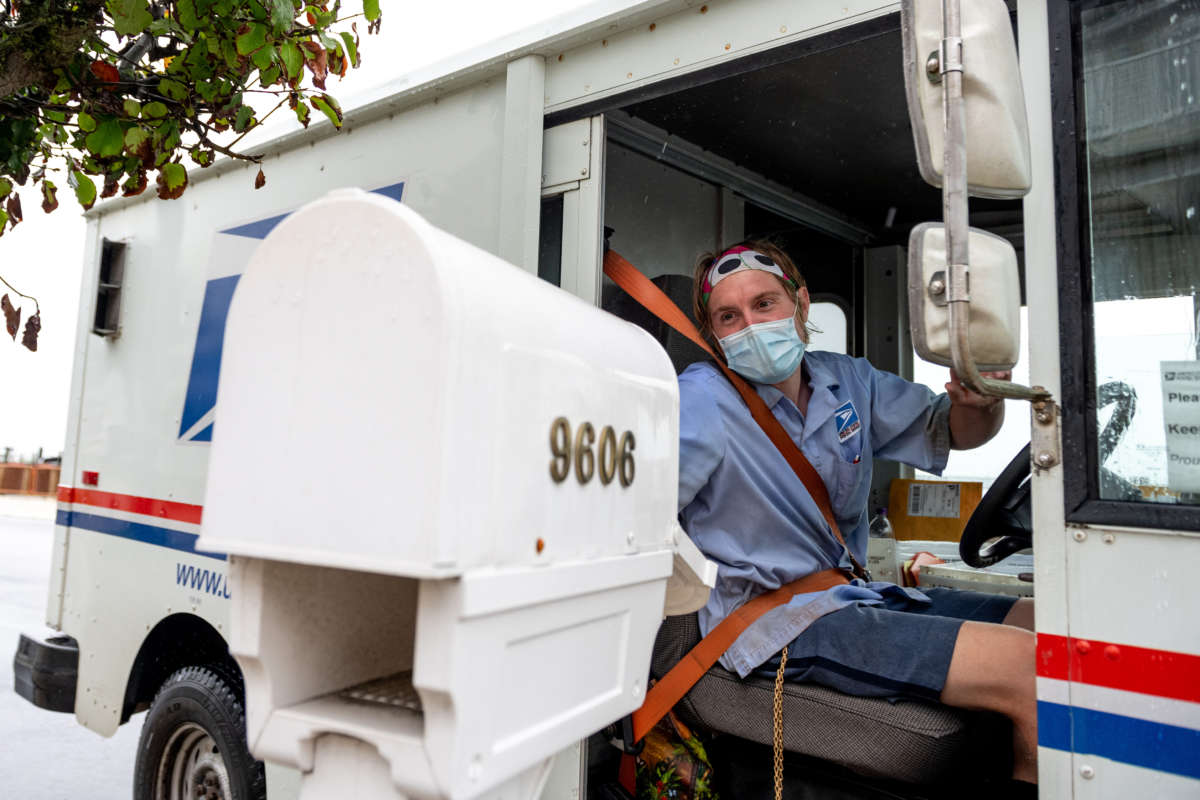The United States Postal Service (USPS) drafted plans to deliver hundreds of millions of masks for use against coronavirus to every household in the country this spring — but the idea was ultimately turned down by the White House.
Working in conjunction with the Department of Health and Human Services, around 650 million reusable cotton face masks could have been sent out, amounting to five masks for every household in the U.S., according to a draft plan offered up by the USPS. The idea was rejected by the Trump administration, which claimed it sought to avoid frightening the public in the early days of the pandemic.
“There was concern from some in the White House Domestic Policy Council and the office of the vice president that households receiving masks might create concern or panic,” an official in the administration told The Washington Post.
Information about the plan offered by the USPS was obtained through a Freedom of Information Act request from American Oversight, a nonprofit watchdog group.
“The Postal Service connects every single person in America, and the president could have used it for public health, but he didn’t,” American Oversight Executive Director Austin Evers said. “An opportunity to deliver science-based public health tools to every person in the country was lost.”
If adopted, the plan could have also signaled the seriousness of the pandemic to residents throughout the U.S.
“Giving out masks to everyone doesn’t mean that people will necessarily wear them, but it does send a strong message that mask wearing is a public health imperative,” Leana Wen, public health professor at George Washington University, said to ABC News.
Instead of sending masks out by mail, the White House instead delivered hundreds of millions of masks to the administration’s “Project: America Strong,” which sent them to more limited sectors, such as private companies, health care groups, and to community and religious organizations across the country.
A number of studies have demonstrated that a significant number of coronavirus infections in the U.S. could have been prevented if universal mask wearing was mandated in the earlier stages of the pandemic. A study published in Health Affairs, for instance, found that these mandates in 15 states plus Washington, D.C., prevented hundreds of thousands from contracting the disease. A separate study from the Massachusetts Institute of Technology also determined that a national mask mandate beginning on April 1 would have brought the cumulative number of deaths from coronavirus by June 1 down by 40 percent.
In spite of recommendations from the Centers for Disease Control and Prevention (CDC) on wearing masks, President Trump has remained a skeptic on their efficacy to prevent the spread of COVID-19.
For the first several months of the pandemic in the U.S., Trump refused to be seen in public wearing a mask, sending a message to his base of supporters that wearing them wasn’t an important public health measure. He also gave reasons, some of which appeared to be based in vanity, such as expressing concern in April over what other world leaders might think of him.
“I just don’t want to be doing — I don’t know, somehow sitting in the Oval Office behind that beautiful Resolute Desk, the great Resolute Desk, I think wearing a face mask as I greet presidents, prime ministers, dictators, kings, queens. I don’t know, somehow, I don’t see it for myself,” Trump said.
The president also appeared to view wearing masks as a political statement, telling The Wall Street Journal in June that he believed they were worn to spite him and show disapproval of his presidency.
In July, Trump finally appeared in public wearing a mask. Yet during a town hall event on Tuesday where he answered questions from voters, he still expressed skepticism about wearing them.
“There are people that don’t think masks are good,” Trump insisted.
Later in the week, CDC Director Robert Redfield contradicted Trump’s claims, stating there was “clear scientific evidence” that masks help to prevent the spread of COVID-19.
“I might even go so far as to say that this face mask is more guaranteed to protect me against COVID than when I take a COVID vaccine, because the immunogenicity may be 70 percent and if I don’t get an immune response, the vaccine’s not going to protect me, this face mask will,” Redfield said during Senate testimony on Wednesday.
Media that fights fascism
Truthout is funded almost entirely by readers — that’s why we can speak truth to power and cut against the mainstream narrative. But independent journalists at Truthout face mounting political repression under Trump.
We rely on your support to survive McCarthyist censorship. Please make a tax-deductible one-time or monthly donation.
